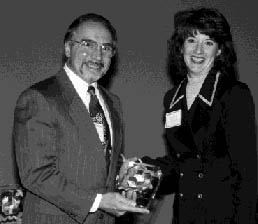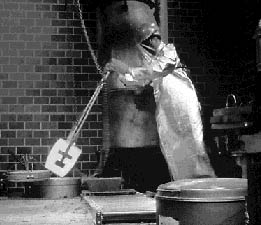
Eleven Western Pennsylvanians were honored recently for outstanding scientific work when Carnegie Science Center presented the first Science Awards for Excellence.
The winners are from academia and the business world, and they and their achievements exemplify the vitality of science and its application in daily life. Together, the winners reveal the links that exist among schools, research laboratories, business development and job creation. The awards also connect the Science Center with research activity in Pittsburgh's universities and industries, and further the Center's mission of improving the quality of life and economic opportunities in the region.
The awards were made possible through the Science Center's Steering and Resource (STARS) Committee as a way to raise public awareness about science and its application in everyday life.

"The role of science and technology often takes a back seat today, while society emphasizes other interests such as sports or entertainment," says Jack Shaw, president of the STARS group. "With our city's transition toward science and technology, Pittsburghers have been making many contributions in that area, and we want to recognize their achievements. We also want to show young people that we as a community value these contributions."
At an awards banquet March 20, the winner in each category received $1,000 and a trophy that was forged at the Science Center's own foundry.
The STARS and Science Center Director Seddon Bennington plan to make the awards presentation an annual event. The endeavor has been launched with the strong support of 14 "presenting sponsors," corporations and foundations committed to the recognition of science achievement. They are Adtranz; Allegheny Health, Education and Research Foundation; Aristech Chemical Corp.; Bayer Corp.; Duquesne Light; Fisher Scientific Co.; Highmark Blue Cross Blue Shield; Michael Baker Corp.; PPG Industries Foundation; The Sony Technology Center - Pittsburgh; University of Pittsburgh Medical Center; USX Corp.; and Westinghouse Foundation. Chairman of the awards program is Jerry Dempsey, chairman and chief executive officer of PPG Industries, Inc.
The award categories emphasize the role of innovative and inspiring teaching in developing students' interest in science, and the partnership of scientists and entrepreneurs in capitalizing on the business opportunities arising from research. The dual focus on education and business reflects the thinking of Science Center Director Seddon Bennington, an advocate of moving science from the classroom into people's everyday lives.
Since assuming the directorship of the Science Center three years ago, Bennington has been committed to making the Center relevant to the local community. He seeks ways to make connections with local hospitals, universities and businesses, and to take up science and technology issues that affect Pittsburgh residents.

"While the value of pure research to extend our understanding of phenomena should not be undervalued, the commercialization of these results is very important for the development of new industries," Bennington says. "In a commercial world increasingly driven by innovation and rapid translation of idea into product, the direct relevance of scientific achievement to economic development has never been more apparent."
And the Winners Are...
Student: David Fang. This award is presented to the overall winner of the Pittsburgh Regional School Science and Engineering Fair. A senior at Franklin Regional High School in Westmoreland County, Fang won Best of Show and First Place Overall in the science fair for his project, "2x Pendulum Motion Functions."
Teachers: Three awards are given to educators who have demonstrated creative teaching strategies and use of outside resources. The elementary and secondary teaching awards were selected from the nominees for the 1997 Teacher of the Year from the Pennsylvania Department of Education.
Elementary: Charles Sosko. Throughout his 30-year teaching career, Sosko has been a proponent of the "inquiry-based," or "hands-on" learning method. He teaches in the Carlynton School District, which is a member of ASSET, a consortium of Allegheny County schools that promotes the hands-on approach. He finds that the students learn best with this method, which is proven by the district's high scores on achievement tests. Children are enthusiastic about science, he says, and parents tell him that their children enjoy discussing the science lessons at home.
Secondary: Edward F. Schroth. A science teacher at Quaker Valley High School, Schroth says he sets the highest standards of excellence, both academic and personal, for his students and for himself. As a result, his students consistently receive awards, and NASA named his environmental science class "#1 1996 Classroom of the Future." Under Schroth's leadership, Quaker Valley initiated the first Sino-American Biology Conference for high school students in Qingdao, China, in 1994, and this summer he will take the second delegation of Quaker Valley biology students to China for the conference.
Post-Secondary: Frank Beatrous. A mathematics professor at the University of Pittsburgh, Beatrous says his main goal in teaching is to create a context in which effective learning can take place. His classes are active forums where students participate in thoughtful analysis, discussion and experimentation, and in building, testing and revising models. His lectures are "orchestrated discussions," interspersed with group activities and more discussion. Beatrous says his broader goal is to create the same environment throughout the mathematics department, which has been facilitated by a grant from the National Science Foundation. His calculus-teaching workshops feature national leaders of the calculus reform movement and have brought together faculty from high schools, colleges and universities from across the country.
Scientists: From Kennametal Inc.-C. Erik Bauer, George P. Grab, Abaron Inspektor, William M. Melago and Edward J. Oles. This award recognizes outstanding scientific accomplishments that increase business opportunities or aid the economic development of Southwestern Pennsylvania. These five Kennametal scientists were instrumental in producing diamond-coated cutting tool inserts that are used primarily in the automotive and aerospace industries. For a decade or more before the invention, scientists around the world had tried without success to adhere diamond coatings to cemented carbide cutting tools. The problem was the presence of cobalt on the surface of the tool. Scientists at Kennametal developed a unique heat treatment that evaporates the surface cobalt while coarsening the tool's surface, providing anchoring sites for the coating and enhancing mechanical bonding.
Entrepreneur: Eric C. Cooper. The award goes to an individual who has successfully commercialized the results of scientific research to develop a business and generate jobs. Chairman and CEO of FORE Systems, Cooper formed this communications company seven years ago with three colleagues at Carnegie Mellon University to commercialize Asynchronous Transfer Mode (ATM), then an emerging standard only for telephone networks. FORE succeeded in commercializing ATM, and in expanding it into a data, voice and video networking solution that has been implemented by their 4,000-plus customers worldwide.
Catalyst: Garry F. Warnock. Recognition goes to a person or group that has excelled in promoting public appreciation of science. As a chemistry lecturer at the University of Pittsburgh, Warnock has co-founded and continues to operate the university's Chemistry and Physics Van Outreach Program, which annually takes scores of dramatic two-hour science shows to elementary and secondary schools and groups in Allegheny County and the region. Each summer, Warnock holds workshops to help teachers develop class demonstrations. He also has produced a series of science kits that teachers borrow to produce their own classroom science shows.
The Scientist, Entrepreneur and Catalyst award winners were selected by a committee of advisors from corporations and organizations in the region.
Kathryn M. Duda is associate editor of Carnegie Magazine.